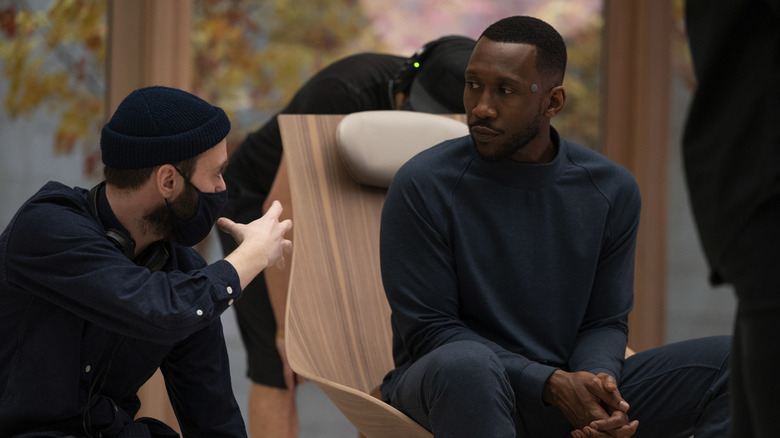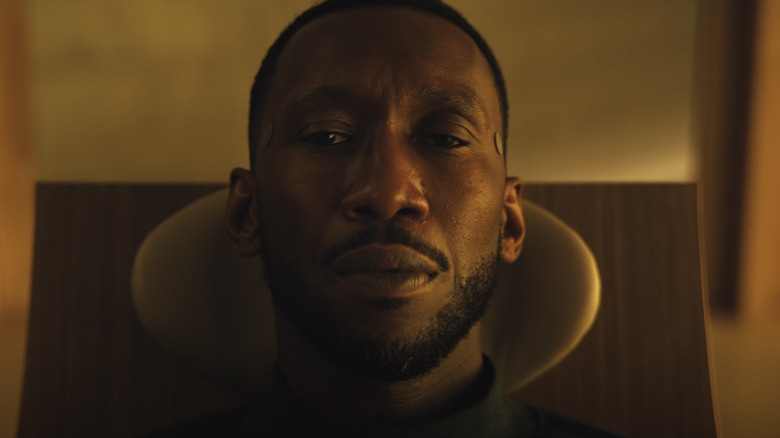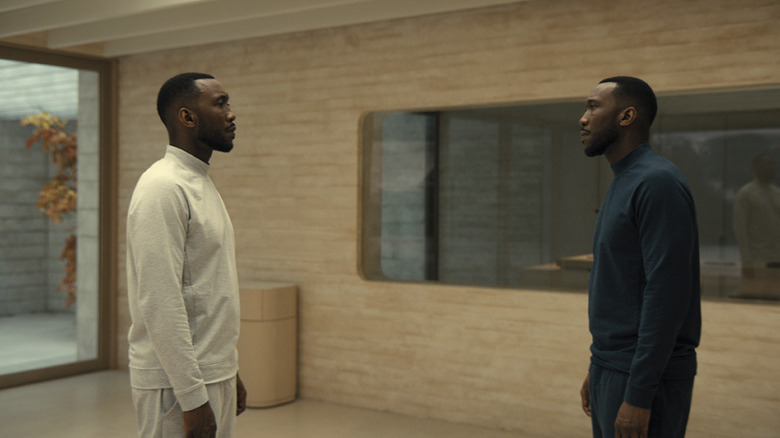Swan Song Director Benjamin Cleary On Envisioning The Future In His Sci-Fi Drama [Interview]
In 2016, writer/director Benjamin Cleary joined fellow countryman Martin McDonagh ("In Bruges," "Three Billboards Outside Ebbing, Missouri") on the short list of Irish filmmakers who have won an Oscar for directing a live-action short film. Five years and another short film later, Cleary is making his feature directorial debut with "Swan Song," a sci-fi drama set 20 years in the future.
The story centers on a man (Mahershala Ali) who, after being secretly diagnosed with a terminal illness, grapples with the decision to transfer his memories into a replica body that will take his place and ensure his family doesn't have to suffer the trauma of losing him. It's a gorgeously shot and deeply moving piece of work, and I was thrilled to speak with Cleary about his experience of making this beautiful movie.
"The dream for a director is when you're talking to an actor and they feel like they've got a connection to the story."
So "Swan Song" is your feature debut, but you had already won an Oscar for one of your short films. I'm guessing that may have helped convince this excellent cast to buy into your vision for what this movie could be. What kinds of conversations did you with them before they came on board?
Yeah, absolutely. I got so lucky with how my short did and that opened up the doors, and then you get to sort of write a feature like this and get it into the hands of phenomenal actors like Mahershala Ali. When I heard that he'd read the script and loved it and wanted to meet, it was a definite 'pinch yourself' moment. I was so close to the material, I'd been writing it for so long with so many drafts that I'd kind of — you lose that sort of sense of objectivity with the writing and you're trusting that emotional scenes you might have written a year ago are still good, but you can't see it anymore. As soon as I started thinking about Mahershala in the role and thinking about his wonderful voice and just reading it with him in mind, the script came to life again.
And then we had this first meeting, we spoke for a couple of hours and straightaway I just knew I was sitting across from someone so wonderful and that was going to be able to do amazing things with this role. When he said he wanted to do the movie at the end of that meeting, it was phenomenal. But the conversations that we ended up having with all of my cast early on were just ones about connection to the material. The film, I hope, throws up some interesting sort of existential questions or interesting questions about what would you do in this situation. So those were the kind of conversations that I was having. The dream for a director is when you're talking to an actor and they feel like they've got a connection to the story and they're already invested in it. So I was having a lot of that, which was great.
Did you ever get any notes suggesting you turn this script into more of a thriller? I love that it's not that type of movie, but I can imagine a scenario in which a financier or something might have gotten a little nervous by the raw emotion that's on display in this story.
Yeah, totally. No, I great partners all the way through, Anonymous Content and Apple, of course, were just like such great partners. All the way through from writing it and knowing what I wanted to make here, there was never that suggestion that we turn the genre and obviously I don't want to go too into spoilers as to how it unfolds, but no, they knew what we were making. I felt really lucky as a first time director because I know that isn't always the case, right? Sometimes you do hear that a script can veer off course for various reasons, but I just felt totally supported in this. Everybody knew what the movie was and supported that all the way through, which was lovely.
"I really wanted us to relate to this world, to feel like it was our world, but just a couple clicks ahead."
Can you tell me about the technology on display here? How did you develop the ideas for what things would look like 20 years into the future?
Yeah, that was huge. That was a massive task, [and a] fun part of it. Because this is a far more a human story and not about the tech, what I needed to do was have a sense of the world building in the story that allowed us as an audience to believe we were in this time where a duplication cloning type technology could exist, but without overburdening it and making it feel like this was too far in the future. I really wanted us to relate to this world, to feel like it was our world, but just a couple clicks ahead. So all of the aesthetic choices we made were linked to that to try to make it feel relatable. I didn't want the lab to look like it had all these screens and computers and all this. I wanted it to recede into the background and be minimalistic. And so that was really, yeah, it was a big part of it. Just try to get out of the way of what was the human story at the center of this.
There are a few sequences that show very quick flashes of a character's memories in the movie. I was impressed by the visual variety in those scenes, but afterward, the practical side of me was thinking, 'Man, that looks like a lot of extra setups for something that was on screen for a fraction of a second.' So how did you approach filming those memory segments?
Yeah, that's a great question. That was a really tough part of it. But how I did a lot of the memories, like the present day, how we shopped out all the present day stuff, it was a different visual style. It was slower push-ins, more composed, considered framing, center frame, a lot of symmetrical stuff. When we went into memories, we did it all handheld and I wanted it to feel really subjective, like we were right there with the characters and immersed. And what we did in a lot of those little snippets were improv. So I would set up a little bit of a scenario and Mahershala and Naomie, and the rest of the cast would riff off that. And they were just phenomenal at doing it and it was grueling for them. They were amazing how they did it.
Sometimes they were long, like it could be a 10-minute take, and in the end you end up seeing five, 10 seconds of it. But what I was really trying to capture were just these little textural, beautiful moments, spontaneous little things that might happen and try to get that into what ends up becoming a kind of textural feel that hopefully feels a little bit like we do sometimes, have memories in that fractured sort of way. So it was just working with great actors who were willing to trust me and go along with me for that ride.
"So many great clone movies out there, but I sort of wanted to find our own thing with it."
There's obviously a deep history of films about replicas. Did you study any of those movies when you were writing this one, looking for maybe structural things or things that you wanted to avoid?
We studied some of the technical elements of how people had shot one actor for two, quite a bit. We really researched how that was done before and which of those elements we'd take on. So from a very technical point of view, definitely, that was part of our research and technology's come along quite a bit now. But I was always hoping to do it in quite a simple way, but not for the structure of it, really – for the narrative structure, I would say. That wasn't really an area I looked at because I felt like I wanted to sort of find our own feet with that, and because it was such a human story and quite personal, I sort of wanted to go our own way with that. And I didn't know if there were other films that had done it the same way as ours. So many great clone movies out there, but I sort of wanted to find our own thing with it.
"Swan Song" premieres on AppleTV+ on December 17, 2021.


